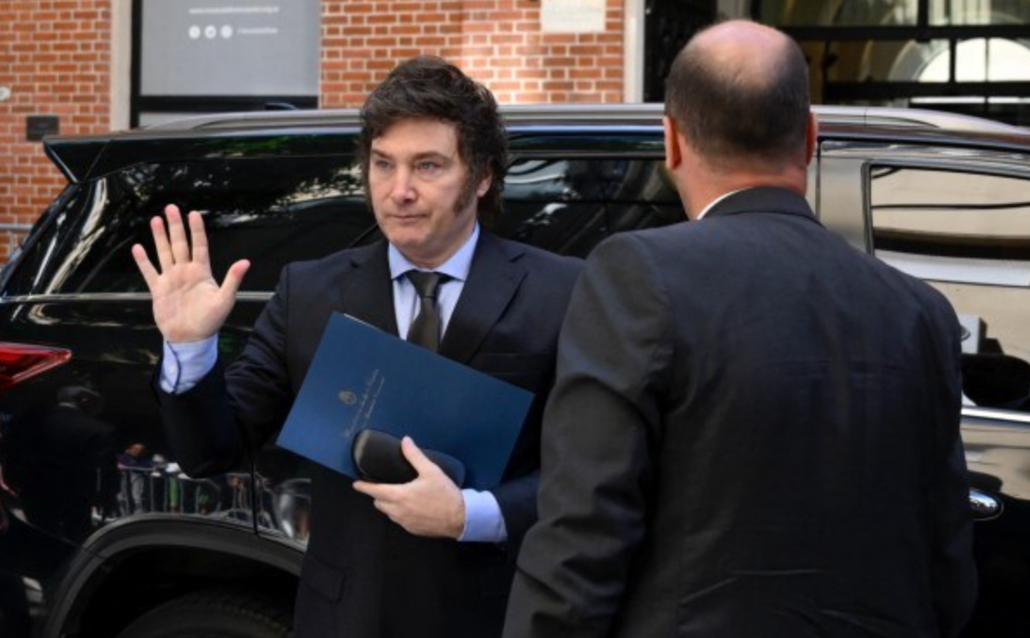
Argentina's Milei Returns Idea of Limited Gov't to Global Stage
The nine most terrifying words in the English language are: I'm from the Government, and I'm here to help.
—Ronald Reagan - Aug. 12, 1986
Most Argentines did not elect eclectic libertarian Javier Milei in November 2023 because they understood his economic philosophy.
Yet Argentines were also skeptical of the traditional right.
Its prior businessman President, Mauricio Macri (2015 to 2019), facing a similarly impossible set of economic challenges and political obstacles, also left the government in financial crisis and economic freefall.
In 2023 disillusioned Argentines saw in Milei’s eclectic style and sometimes vulgar yet intellectual condemnation of the Argentine government and elites, something very different than the traditional politicians that had repeatedly let them down.
Media attention to Milei as self-professed "anarco-capitalist" focused mostly on his style including his tousled hair and "stunts" for television, including costumes and chainsaws.
They are only now discovering the intellect of this man and his message.
Milei’s playful yet devastating dissection rebuttal of John Maynard Keynes (whose work is the foundation of modern government economic activism), is brilliant in a way that only economists and other true "geeks" can appreciate.
His interview with The Wall Street Journal demonstrated a command of economic management seen more often in Central Bankers than Presidents.
Most importantly, Milei has returned Libertarianism to the global stage.
Milei’s eloquent presentation of the individual, over government, as the source of initiative and generation of value, shocked and titillated the globalist elite at the (WEF) World Economic Forum in Davos, in part because it has been so long since a world leader has made that case in such an unapologetic and theoretically grounded form.
That simple yet compelling message, once professed by luminaries from Ronald Reagan and Margaret Thatcher, to economist Milton Friedman, and philosopher Ayn Rand, played a role in helping the United States to prevail in the Cold War.
Today it is arguably the missing cornerstone in responding to both China’s advance, and Latin America’s misplaced look to government to solve its economic and social challenges.
For the last two decades, China’s economic growth has seemed to highlight the value of the State as a tool of development, albeit at the cost of individual privacy and freedom.
Meanwhile, in Latin America, the perceived failures of market-oriented governments to make meaningful progress against inequality, corruption and insecurity has opened the door to a range of government-first solutions, from populist authoritarian regimes in Venezuela and Nicaragua, to statist social democracies in Mexico, Brazil, and Chile.
In Latin America, long accustomed to look to strongmen and big government to rescue society from poverty, crime and injustice, Milei proclaims a powerful, contrasting truth: it is the individual, and their initiative, freely associating in groups and markets, and not governments, which generate wealth and progress.
In the Cold War, like today, the U.S. championed "democracy," yet what leaders such as Ronald Regan truly tapped into was the universal yearning for "freedom," against regimes which crushed both body and soul, dictating what could be done, expressed, and dreamt of.
Today, as policymakers in Washington wring their hands over the U.S. inability to "outbid" Communist China for the affections of Latin American elites, the missing ingredient in defining the existential stakes in resisting the seduction of China is "freedom."
Yet when the Western democracies that once led the fight against Communism themselves push redistributive economic policies and social engineering, with a "woke" elite dictating what types of speech, associations, and fuels are forbidden, is it surprising to find moral confusion regarding what exactly, in China’s advance, the West is struggling against?
While government has its purpose, Milei has done Argentina, the region and the U.S. an invaluable service by shifting the policy debate away from "how can government help?" to "where is the government role so indispensable that it mut be tolerated," and "how can we reduce the inefficiencies and risks to liberty where government must have a role?"
As January of 2024 ended, despite opposition from powerful vested interests, Milei appeared to have a chance of implementing at least a part of his bold legislative agenda to put his ideas into action, with partners such as the (IMF) International Monetary Fund supporting his efforts.
If Milei is able to rescue Argentina, he will not only transform the country, but his ideas will have the potential to reorient the region.
With luck, he might even help the US to rediscover its own spirit of liberty and compassionate, tolerant individualism that makes it a beacon to the world.



